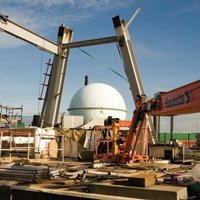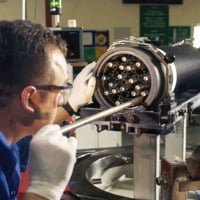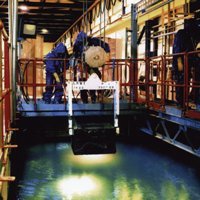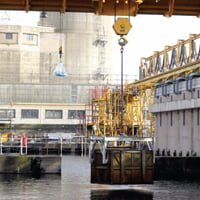
In 2005 the government brought this work under the control of a new organisation, the Nuclear Decommissioning Authority (NDA). NDA does not directly manage the UK’s nuclear sites. It oversees the work through contracts with specially designed companies known as Site Licence Companies. NDA determines the overall strategy and priorities for managing decommissioning.

- eliminate site hazards and develop waste solutions
- ensure the highest standards in safety, security and environmental management
- build an effective world-class industry
- gain full approval and support from stakeholders (employees, contractors, government, local communities and the general public)
- make best use of assets and maximise value-for-money.
Achieving NDA’s goals is critically dependent on people those employed by NDA and those working for the contractors. In order to achieve its objectives NDA and the industry must recruit and retain talented staff. This is challenging due to the high retirement rate in its ageing workforce. Jobs may involve moving to remote parts of the UK. In addition to this, there is some public prejudice against nuclear power and its perceived safety which could discourage new recruits. Many people are not aware that the nuclear industry must meet the highest standards of safety for its people.
NDA holds ‘Investors in People’ status. This shows that the organisation works hard to meet the needs of its employees. It does this through its human resources (HR) strategy which involves:
- retaining and re-skilling staff through specialised training courses
- encouraging more GCSE science students through the Energy Foresight programme
- direct sponsorship of students at university studying relevant courses
- an industry-wide nuclear graduate scheme giving two years professional development
- linking with national initiatives such as the establishment of the National Skills Academy for Nuclear (NSAN) to co-ordinate the industry’s training opportunities, National Vocational Qualifications (NVQ), apprenticeships to foundation degree level
- the promotion of postgraduate research at universities, nuclear companies and specialist centres such as the National Nuclear Laboratory.
This case study will show how developing a motivated workforce enables NDA to deliver safe and sustainable solutions to nuclear clean-up and waste management.

However, it is not just the level of output that improves. Motivated staff work to higher standards of quality because they care about what they are doing. They learn faster and have more ideas. They are less likely to cause accidents, make mistakes or get involved in conflict.

Achieving a motivated workforce is neither cheap nor easy. However, the expense and effort can be well rewarded. The style of leadership and management associated with a motivated workforce is difficult to copy. This makes motivation a potential source of competitive advantage.
The earliest effort to explain motivation at work was published in 1911 by Frederick Taylor. As an engineer, Taylor saw the need for a scientific approach to improve productivity. His findings led employers to break down work into simple repetitive tasks and to pay workers strictly by results.
While this style of ‘scientific management’ was very successful in mass production industries (early car assembly is a good example), it is not effective in today’s knowledge-based industries. NDA does not employ staff as a ‘pair of hands’ but needs commitment from the whole person, including their ideas and innovation. The skilled roles its people carry out are complex and often unique.
From his research at the Hawthorne plant of the Western Electric company in Chicago in the early 1930s, the theorist Elton Mayo concluded that motivation relies on teamwork and the importance of managers taking an interest in the workers. In practice, this requires good communication, an employee involvement in decision making and a focus on the well-being of the workforce.
In 1943 the US psychologist, Abraham Maslow proposed that people are motivated by a ‘hierarchy of needs’. Maslow suggested that people are motivated by different things. He argued that once a level of need is satisfied, it loses its power to motivate and the next level takes over.
This means for example, that offers of better pay alone will not satisfy someone who is looking for more self esteem. This is recognised by leaders and managers at NDA. For example, pension schemes help to meet safety needs. Self-actualisation may be reached through training opportunities, such as the management development programmes, or promotion.

The NDA Way shows how the organisation demonstrates its values. These values provide the setting for motivating its employees. The NDA Way includes:
- ‘always acting safely and responsibly
- building talent and teams
- being open and transparent
- challenging ourselves and our contractors
- confronting problems
- delivering what we promise
- learning from experience.’
This model allows both Maslow’s lower order and higher order needs to be met by providing a safe, secure environment and good conditions, increasing skills and developing talent, and challenging people to improve.

These ‘hygiene factors’ could cause dissatisfaction if they were absent or inadequate. Improvements in the hygiene factors would prevent dissatisfaction but would not provide motivation.
- Piece-rate is a traditional method of payment but is only relevant if output can readily be measured.
- Commission payments, which directly reward staff for achieving sales, are also unsuitable for NDA.
- Performance related pay has become popular. This rewards employees who achieve their agreed targets. NDA sets personal and organisational targets that trigger additional payments.
More highly skilled employees look for long-term progression in their careers. This helps them meet their higher order needs. Much depends on the training and development opportunities within an organisation. For many staff this growth in personal capabilities directly increases job satisfaction. It also makes promotion more likely. This in turn brings increased responsibility, status and esteem.

The extent to which jobs meet people’s needs depends on their design. Some firms attempt job enlargement by giving staff extra tasks or responsibilities. Others have introduced job rotation where staff exchange jobs of comparable skill around the organisation. In some organisations this can just lead to employees moving from one boring job to another.

Decommissioning involves a wide variety of projects. Each of these poses a unique challenge. Projects involve a large number of linked activities. Each project group is composed of people with the right skills to fulfil its objectives. NDA needs flexible people, able to work in teams and learn continuously from experience. Employees must accept and act on feedback.
Team working links with Mayo’s human relations school of motivation. This is particularly crucial when looking for innovative approaches to decommissioning. Within the team, each person is assigned the roles for which they are best qualified. Each person needs to be committed to the highest standards of quality in their role. This implies continuous learning where training and personal development are never complete.
The NDA’s view is that the Authority’s objectives and employee objectives have a win-win relationship. To fulfil their potential, staff need to build on existing skills and capabilities. These are assessed jointly by the authority and the employee leading to a clear picture of training and development needs. Every employee has a Personal Development Plan with SMART objectives and paths to professional accreditation where relevant.
NDA also recognises that skilled and committed people in a long-term career cannot separate work from the rest of their life. People content with their work-life balance are more amenable to being motivated by good leadership. It is therefore NDA policy to help staff find an effective work-life balance. They provide assistance in moving home when employees are appointed or relocated. The organisation also offers staff a wide range of personal benefits such as family leave and counselling.
Jobs can imprison people or set them free. Management and the organisation’s culture can determine whether people feel enthusiastic about work or whether they just turn up every day. Every job has the potential to motivate or demotivate.
Motivation affects every aspect of a business organisation. At the most basic level it can increase output and drive down cost. At higher levels, it enables people to be trusted and to take responsibility. It can build teams of people with common agreed goals and give them the self-belief to keep learning as they tackle progressively greater challenges.
NDA in particular operates in an industry where attracting and retaining skilled staff is a top priority. The organisation sees its training and welfare provisions for employees as a long-term investment. Motivation at NDA is not just about working harder, faster or more effectively. It is about commitment to NDA’s mission on which the future of the industry and public safety ultimately depend.
